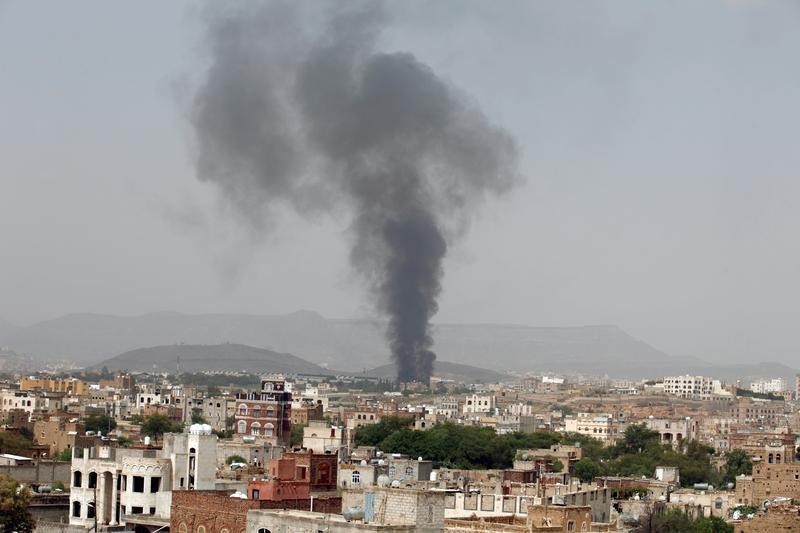By Phil Stewart
WASHINGTON (Reuters) - The U.S. military has withdrawn from Saudi Arabia its personnel who were coordinating with the Saudi-led air campaign in Yemen, and sharply reduced the number of staff elsewhere who were assisting in that planning, U.S. officials told Reuters.
Fewer than five U.S. service people are now assigned full-time to the "Joint Combined Planning Cell," which was established last year to coordinate U.S. support, including air-to-air refueling of coalition jets and limited intelligence-sharing, Lieutenant Ian McConnaughey, a U.S. Navy spokesman in Bahrain, told Reuters.
That is down from a peak of about 45 staff members who were dedicated to the effort full-time in Riyadh and elsewhere, he said.
The staff withdrawal, which U.S. officials say followed a lull in air strikes in Yemen earlier this year, appears to reduce Washington's day-to-day involvement in advising a campaign that has come under increasing scrutiny for causing civilian casualties.
The U.S. military personnel were withdrawn from Riyadh in June, U.S. officials said.
"The shift does not diminish U.S. commitment to supporting Saudi-led military operations. The JCPC forward team that was in Saudi Arabia is now in Bahrain," said Chris Sherwood, a Pentagon spokesman, who added that U.S. aerial tankers continue to refuel Saudi aircraft.
The U.S. officials said the reduced staffing is unrelated to the growing international concerns over civilian casualties in the 16-month civil war that has killed more than 6,500 people in Yemen, about half of them civilians.
The officials, speaking on condition of anonymity, stressed that as the strikes intensify again, the U.S. might decide to readjust its support. Peace efforts in Yemen have stumbled, and the Saudi-led coalition's air campaign against Iran-allied Houthi rebels has been stepped up once more.
The conflict has brought Yemen close to famine and cost more than $14 billion in damage to infrastructure and economic losses.
A spokesman for the Saudi-led coalition, Brigadier General Ahmed al-Asseri, declined to confirm details about the positioning of U.S. military personnel, but played down such moves.
"The relationship between the kingdom and the U.S. is a strategic one. If true, this move reflects something at a tactical level," Asseri told Reuters. "The U.S. may move its assets, but that doesn't have any impact on the bilateral relationship between the countries."
EXTENSIVE U.S. SUPPORT
Since the campaign began, the U.S. military has conducted an average of two refueling sorties every day. The United States also has provided limited intelligence support to the coalition but officials stress that Washington has not selected targets.
American officials have said they have sought ways to help the coalition improve targeting and have ensured Saudi access to precision-guided munitions. The Pentagon also has sent U.S. military lawyers to help train their Saudi counterparts on how to ensure the legality of coalition strikes.
In recent months, however, the United Nations, international humanitarian organizations and even some U.S. lawmakers have criticized the coalition air strikes.
An annual U.N. report on children and armed conflict said the Saudi-led coalition was responsible for 60 percent of child deaths and injuries in Yemen last year. Saudi Arabia has said the report is based on inaccurate information.

On Tuesday, a coalition air strike hit a hospital operated by medical aid group Medecins Sans Frontieres in Yemen, killing 19 people and prompting the group to evacuate staff from six hospitals, citing a "loss of confidence in the Saudi-led coalition to prevent fatal attacks".